1964 World Series Aftermath:
Baseball Plays Its Version of “Musical Chairs!”
“I managed good but boy did they play bad.” –Johnny Keane, commenting on his lack of success as Yankees’ manager.
The dysfunctional 2020 baseball season is over, the playoffs are in full swing, and the World Series looms just over the horizon.
Of course, we’d be remiss if we failed to mention the passing of the great Hall-of-Famer, Bob Gibson this week. He was probably the most dominant pitcher any of us old-timers have ever seen. So I thought this would be a good time to recall the truly bizarre events that followed in the aftermath of the 1964 World Series.
Gibby, as I’m sure many of you will remember, was the 1964 World Series MVP (winning his first of two), going 2-1, with a 3.00 ERA, and two complete games over 27 innings pitched. [Ed. Note: we will have a fitting tribute to Bob Gibson coming up soon].
Fifty-six years ago this month, on October 16, 1964, Johnny Keane abruptly resigned as manager of the Cardinals, just 19 hours after the Redbirds defeated the Yankees in the 1964 World Series four-games-to-three. At almost the same exact time, the Yankees fired first-year manager Yogi Berra and replaced him with…you guessed it…Johnny Keane. Baseball’s version of “musical chairs” was now underway!
In the featured photo above, we see St. Louis natives Johnny Keene and Yogi Berra embracing following the conclusion of the 1964 World Series.
Johnny Keene was a prototypical baseball lifer who spent 35 years in the Cardinals organization. After 21 loyal seasons rotating through the Cardinals’ farm system, he was named the club’s major league manager on July 6, 1961, replacing Solly Hemus. In his four seasons at the Cardinals’ helm, which included a World Series championship in 1964 – the club’s first since 1946 – he posted an outstanding 317-247 record (.562) and never had a losing season. Prior to his arrival, the Cardinals had suffered through losing years in five of the previous seven seasons.
It was expected to be a four-team race in 1964 between the Dodgers, Giants, Reds, and Cardinals; but the surprise of the National League was the Phillies. As the season wore on and it looked like the Phillies had the pennant sewed up, the Cardinals, like many other teams, started looking towards 1965. Staring up at their second straight second-place finish, the organization needed to figure out how to get to the next level.
Enter Branch Rickey. He was hired as a management consultant, and under his influence, the Cardinals were now “looking to go in a different direction,” as the tired old baseball cliché goes. One of Rickey’s first recommendations was to shake up the front office, including Keane’s friend and mentor, General Manager Bing Devine. Though nothing was official, there were also rumors flying around that Keane himself was going to be sacked after the season. And his replacement? The name of Branch Rickey’s protégé Leo Durocher was being bandied about.
Johnny heard the rumors and wasn’t happy…
Loyalty was sacrosanct to Johnny Keane. To him, Gussie Busch had violated the trust Johnny had established with the organization over many years of loyal service and he just couldn’t find it within himself to forgive the Cardinals’ owner. In short, he felt betrayed. Johnny’s personal code of ethics required that he take action. And so he decided to quit.
But the Phillies epic collapse towards the end of 1964 changed the National League’s dynamics, and the Cardinals, sparked by the earlier Brock-for-Broglio trade, suddenly – and quite unexpectedly – found themselves as the 1964 pennant winners and World Series champions. In one of the most bizarre press conferences the game has ever seen, Keane announced his resignation after the Cardinal’ World Series victory. He handed new GM Bob Howsam a letter he had written back in September.
At about the same time, as I mentioned, Yogi Berra was being sacked in New York by the Yankees. Apparently, a World Series appearance in his first year wasn’t good enough to save Yogi’s job. And who was Yogi’s replacement? Johnny Keene!
Johnny never got much out of the Yankees during his tenure in New York. He just didn’t seem to be a good fit in the Big Apple, as his distant demeanor clashed with the players and the press. Perhaps they resented him as an outsider, or perhaps because he was a career National Leaguer. Maybe they were still reminiscing about the glory years under Casey Stengel. Whatever the reason, they finished a distant sixth in 1965. After a 4-16 start in 1966, Keane was “called into the office,” given the old “pink slip,” and was suddenly out of a job.
While Johnny Keane took a lot of the heat for the Yankees performance, it was obvious that the Yankees were not the same team that had dominated baseball for the past 20 seasons. Meanwhile, the Cardinals achieved sustained success under new manager Red Schoendienst, winning pennants in 1967 and ’68, and the 1967 World Series.
Sadly, it was later revealed that the Cardinals had decided against firing Keane and were about to offer him a three-year extension. Owner Gussie Busch was taken completely by surprise by Keane’s resignation, saying, “This really has shocked me. I didn’t know a thing about it until I saw Johnny this morning. All I can say is that I’m damned sorry to lose Johnny.”
Here’s some interesting information about the career of Johnny Keene:
“Johnny Keane never played in the major leagues; beginning in 1930, he was a shortstop in the Cardinals’ minor league system but suffered a head injury in 1935 after being hit by a pitch and lay in a coma for weeks. He began his managing career in 1938 in the Cardinals’ organization and spent a decade as manager of top St. Louis farm clubs. Keane reached the majors in 1959, when he was named the Cardinals’ third-base coach and was named manager on July 6, 1961. Besides winning the 1964 World Series, he is remembered for his positive role in mentoring young Cardinal players, especially star pitcher Bob Gibson.”
Johnny Keene died of a heart attack on January 6, 1967 at the age of 55. Did he regret his decision to leave the organization in which he had spent most of his professional life and where he had achieved his greatest success? We’ll never know. It was suggested in baseball circles that the pressure of winning in New York could have led to Johnny Keane’s early demise.
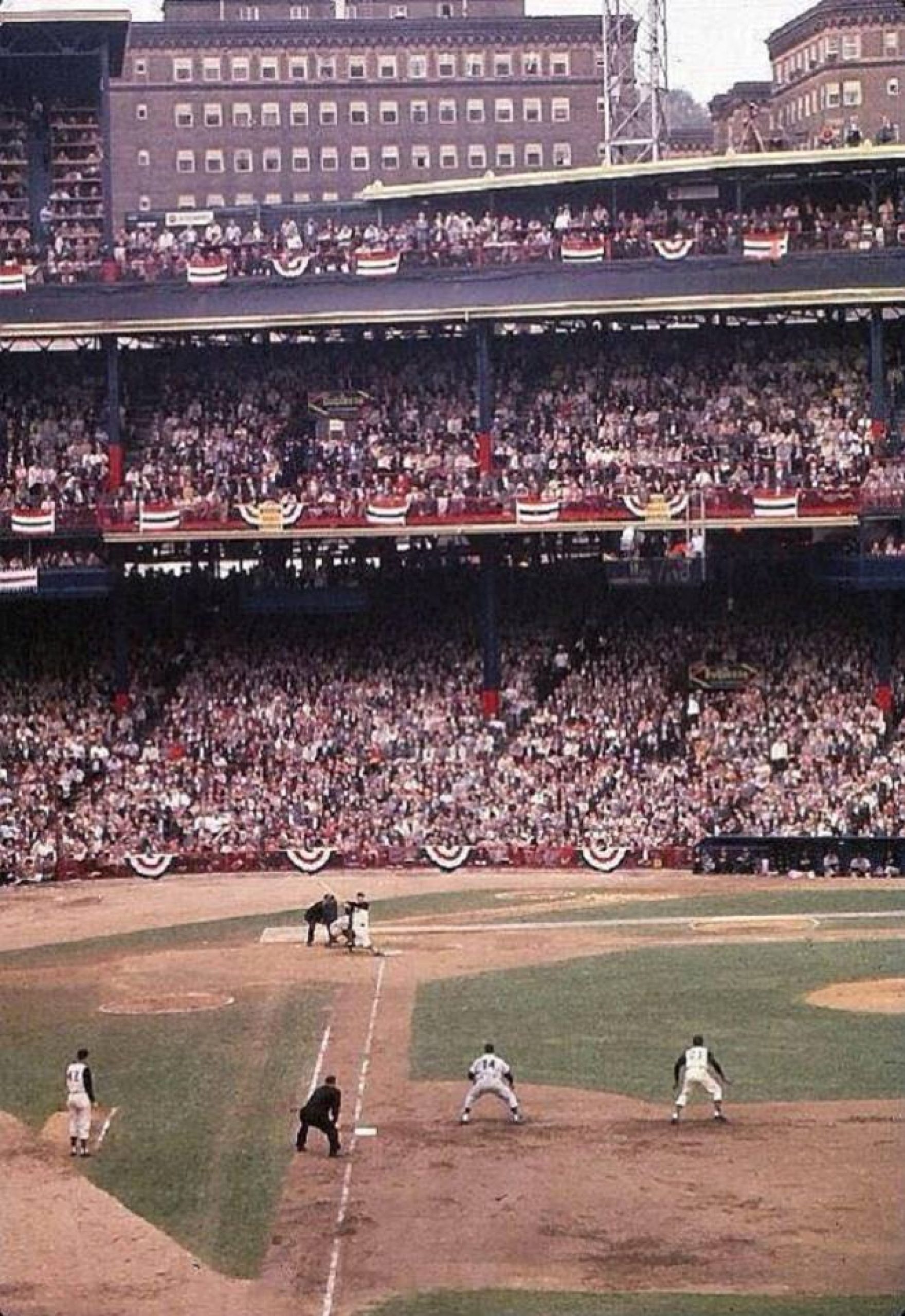
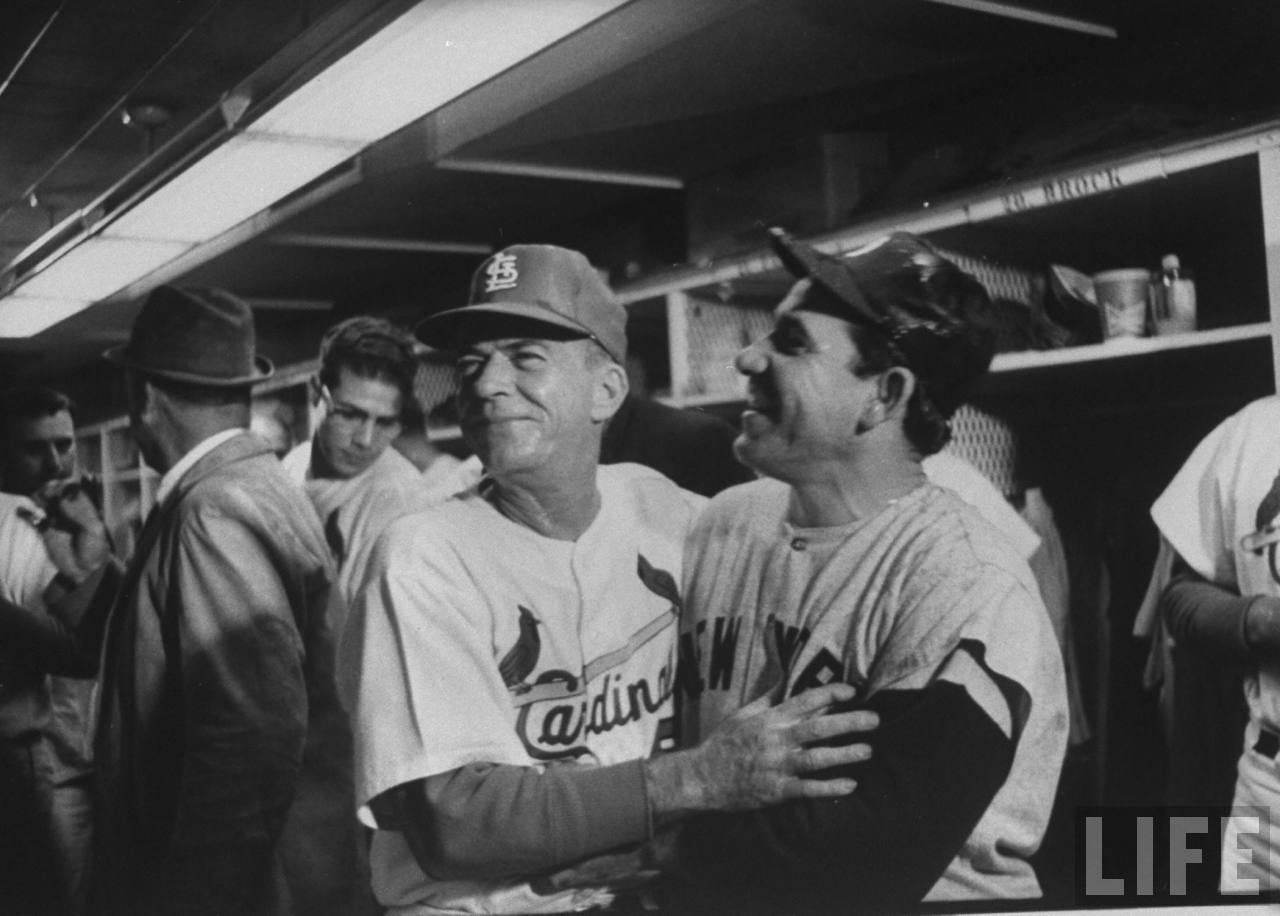
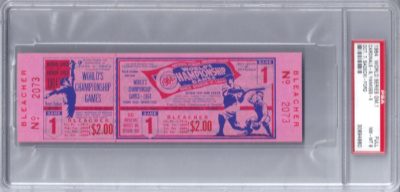
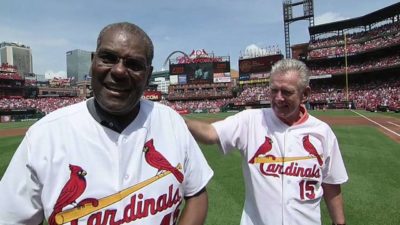
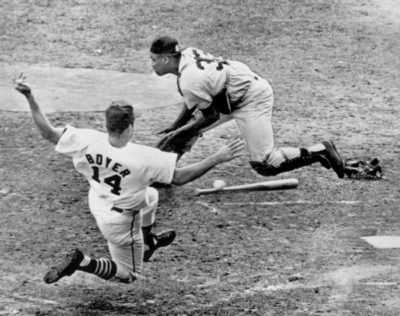
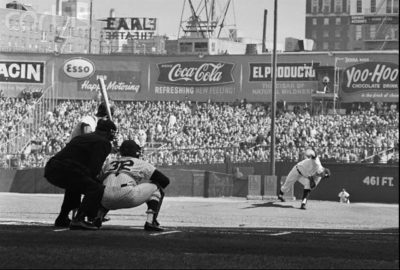
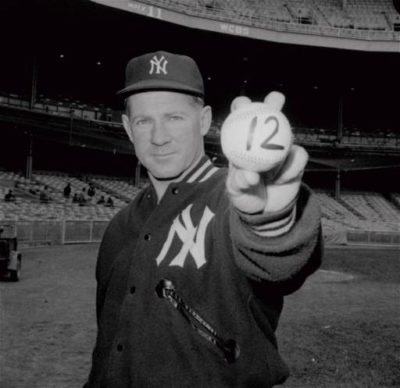
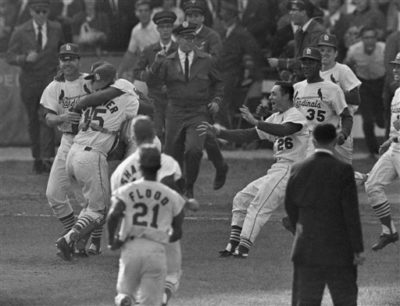
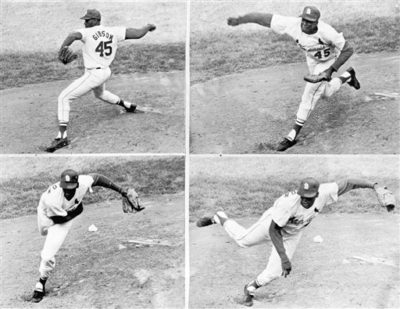
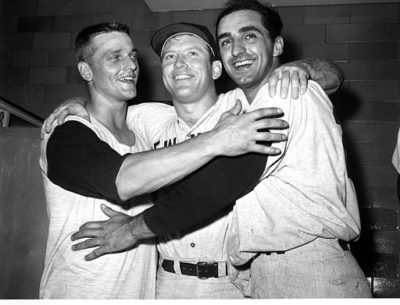
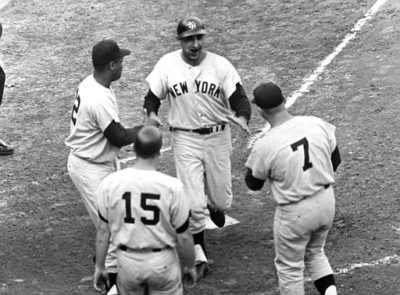
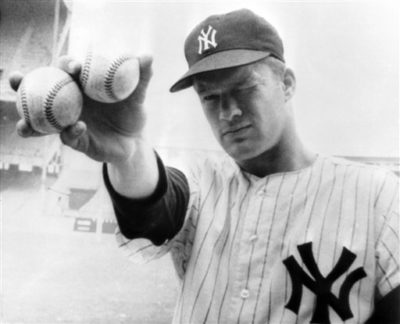
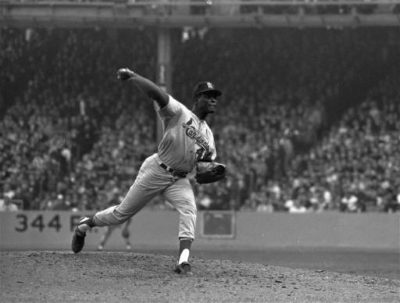
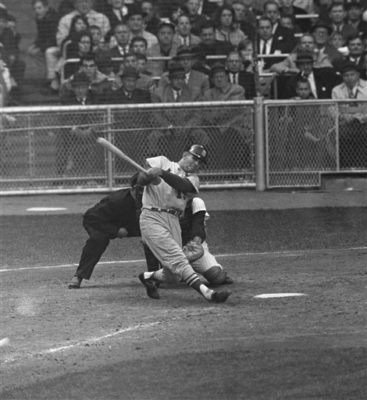
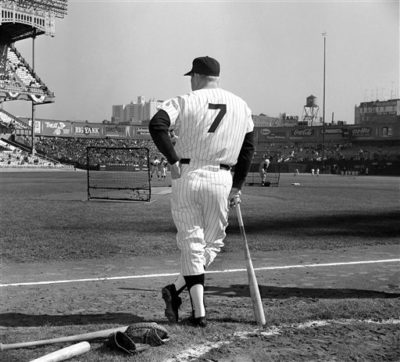
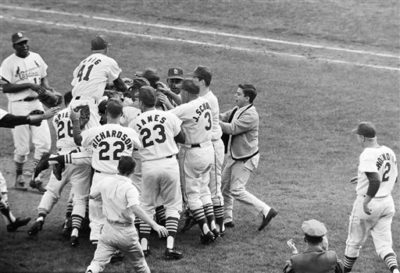
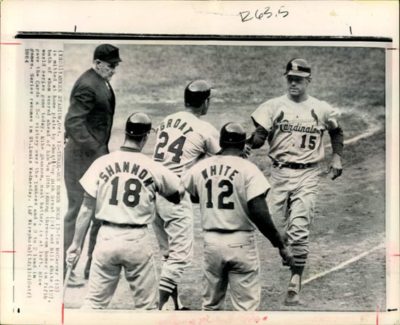
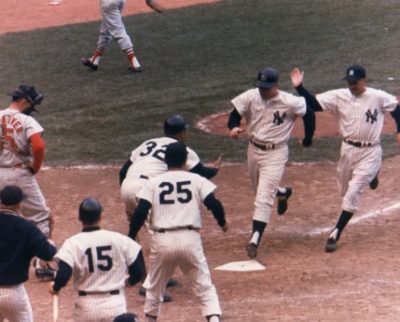
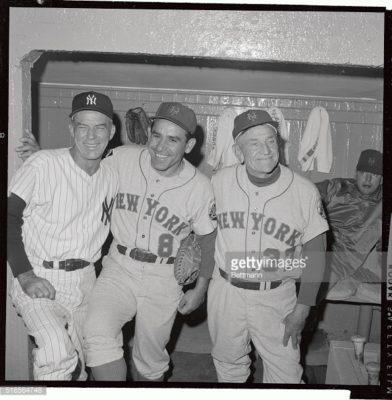
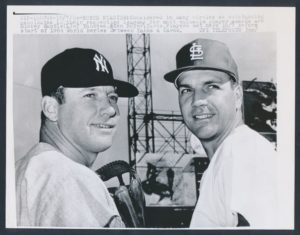
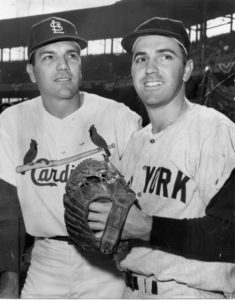
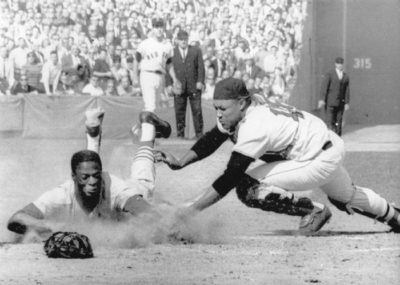
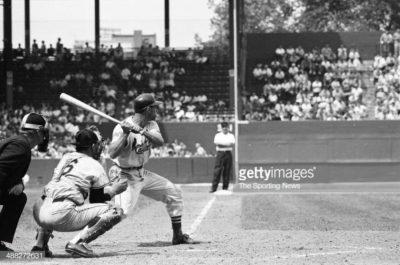
I was 13 years old and it was a great WS! David Halberstam’s “October 1964” is absolutely one of the best baseball and social history books ever written. A must read!
James,
I agree that Halberstan’s book was tremendous. I was the same age in 1964. I also remember during the WS that year, Nikita Khrushchev was ousted as leader in the Soviet Union. It was also deep into the Presidential election season with Lyndon Johnson going up against Barry Goldwater. The nation had sustained a summer of riots as civil rights legislation was being fought. 56 years later, it seems at times, that we are fighting the same battles.
Wasn’t it a GREAT season?! So exciting except my Dodgers went into a nosedive as defending World Champs. It was a wonderful time growing up in Newark, NJ. The NY World’s Fair opened as did brand new Shea Stadium. All we did was play baseball, morning, noon and night! Kept me skinny as a rail. Attended Williamsport Baseball Camp for two weeks in July. Still have my report card ……….average. Would try to get Phillie’s games on my transistor radio at night but boy, the static was annoying out in Williamsport. Great memories.
Keene always struck me as being a bit off track.
Yeah, growing up and those great summers stretching out…playing ball, watching the Giants, Dodgers, Yankees, green grass, Good Humors, movies and the shore…girls later.
Barry Goldwater in ’64, “A Choice not an Echo.” Mocked for making outrageous statements–though many, later, were thought to be quite reasonable.
The former genius manager Gene Mauch was responsible for the greatest collapse in baseball history.
All good points, Bill. Thanks!
Wilhelm happens to be blessed with a native instinct for recognizing when somebody’s “a bit off track.” (Don’t ask; just trust me on this.)
Then again, he may be pulling our collective jersey to say that in ’64 we were all playing ball (true), watching ball ( also true), pounding Good Humor bars (excessively true), hitting movie theaters (that too) and the shore (well, not this landlocked Cornhusker) — but that girls came. . .”later”??! Please, Bill! Our group suspension of disbelief isn’t quite THAT willing.
On the other hand, with fifty-plus years’ hindsight to help show me the way I cannot agree more with Dr. Schaefer that many of Barry Goldwater’s ideas of that long-ago time, once thought to dominate the treacherous fringes of thoughtful social discourse, have proven to be not only “quite reasonable,” but prescient, in fact. Even if he wasn’t chasing after wimmin in his callow and wasted youth, the gentleman (I mean Bill here) definitely knows whereof he speaks. In that singular regard you mind. (The Jints? Not so much.)
Dr. Livacari’s baseball blog is not really an open invitation to his many followers to sound off on political issues of the day, but I wouldn’t object if WS (not World Series, and not White Sox either) chooses to tie the geopolitics of 56 years ago to the many exasperating cultural experiences plaguing us in ’20. I am confident he won’t be thinking about those many connections for the very first time.
All that gibberish notwithstanding, Gary, I too greatly enjoyed your article. It sparked a ton of intoxicating memories. Thank you!
Thanks Michael…I THINK I catch your drift! Haha…Thanks again!
You see, Michael, even the perspicacious Dr. Livacari sometimes struggles to interpret your lofty eloquence. You speak of intoxicating memories. And I must say, a taste of the grape does help me to better understand you. (hope you enjoy my “stench” of humor!)
Just for clarification, I did conflate a decade or so in reference to my callow youth. Yes, by 1964, I was more interested in girls than Happy Felton’s Knothole Gang.
Ain’t we got fun?
You guys are a stitch! Gutman and I just converse in lowly English! Nothing like you guys!
The new “Dynamic Duo” – Schaefer and Keedy. Wow! Awesome lingo!